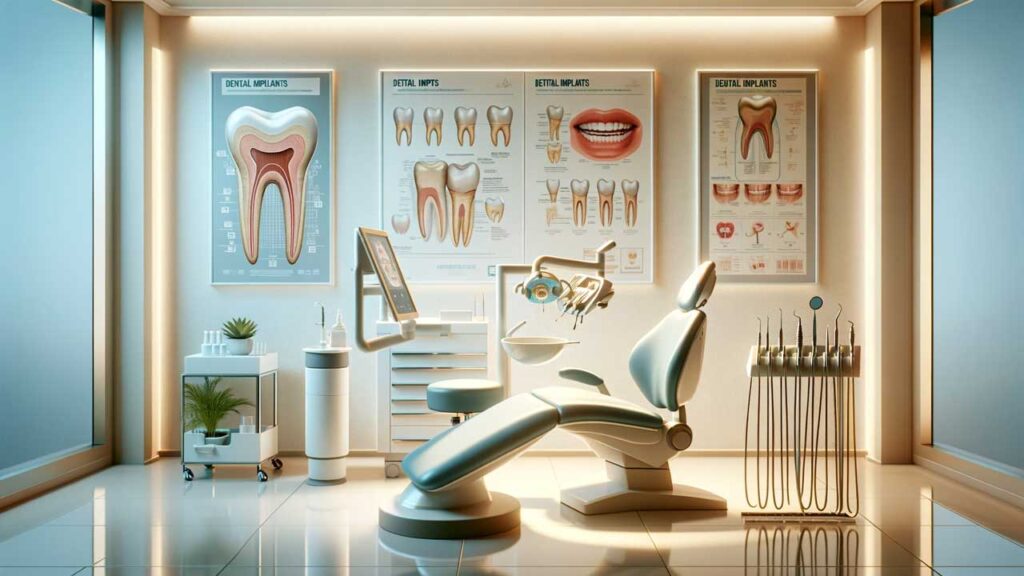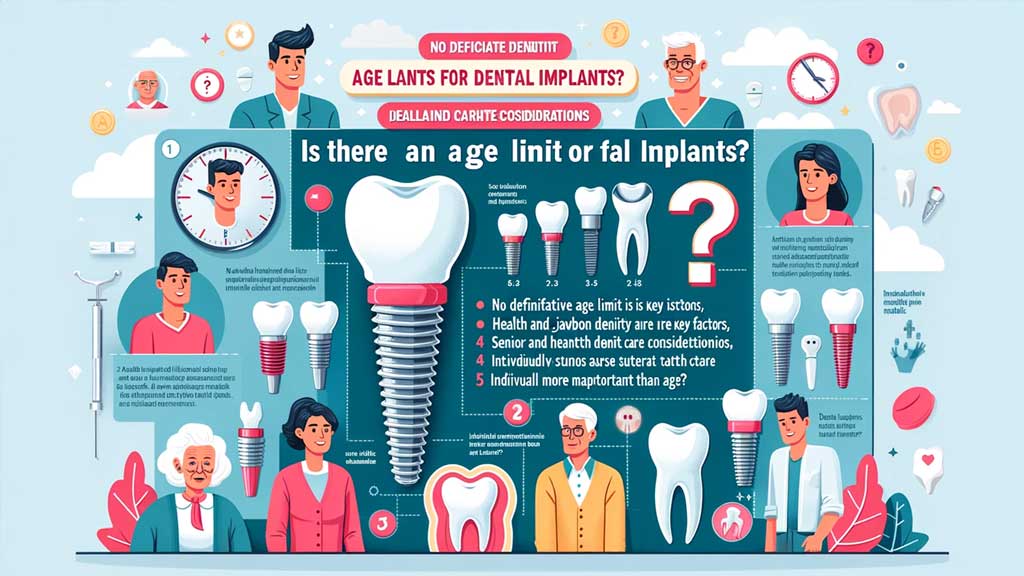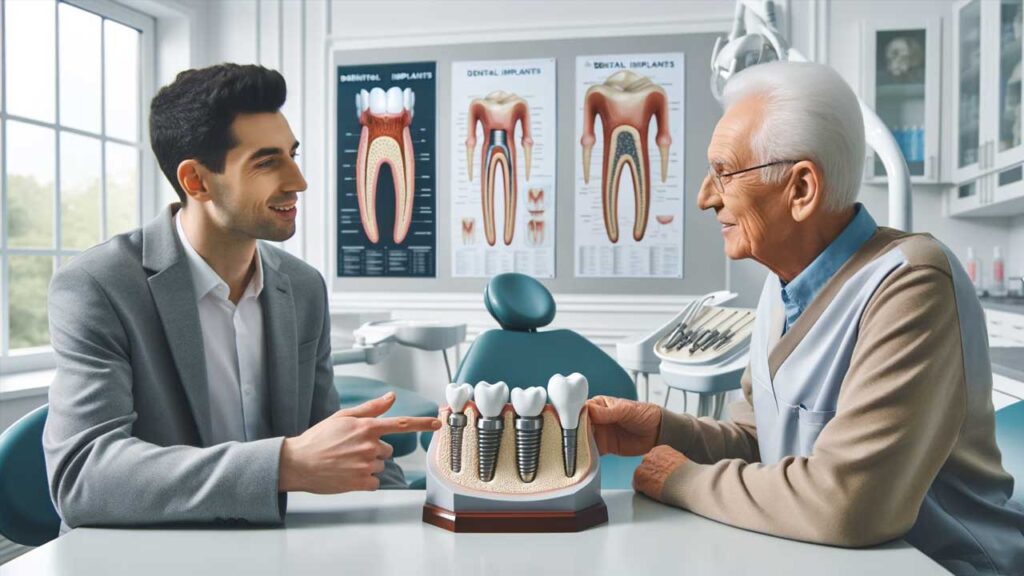In the world of dental care, dental implants have emerged as a significant advancement, especially for those considering tooth replacement options. A common question that arises is about the ideal timing for these implants. This article aims to explore the fundamentals of dental implants and the influence of age on their suitability.
Understanding Dental Implants
Dental implants are an innovative solution for missing teeth. Unlike traditional dentures or bridges, these implants are designed to integrate with your jawbone, offering a stable and long-lasting solution.
What Are Dental Implants?
A dental implant is a titanium post that replaces the root of a missing tooth. This post provides a strong foundation for a permanent or removable replacement tooth that matches your natural teeth.

Types of Implants: Endosteal and Subperiosteal
There are two primary categories of dental implants:
- Endosteal Implants: Placed directly into the jawbone, these are the most common type.
- Subperiosteal Implants: Positioned on top of the jawbone, under the gum, these are an alternative for patients with insufficient jawbone height.
The Role of Titanium in Implants
Titanium, known for its durability and compatibility with the human body, is widely used in implants. It allows for the integration of the implant with the bone, a process essential for the stability of the implant.
Comparison of Dental Implants and Traditional Dentures
| Feature | Dental Implants | Traditional Dentures |
| Stability | High, as they fuse with bone | Less, can slip or move |
| Bone Preservation | Prevent bone loss | May accelerate bone loss |
| Lifespan | Can last a lifetime with proper care | Require replacement every 5-8 years |
| Comfort | Mimic natural teeth, comfortable | Can cause discomfort, especially if ill-fitting |
| Eating | Allow for normal eating | Can limit types of food that can be eaten |
Implant Success Rate Statistics
The success rate of dental implants typically exceeds 95%, influenced by factors like the patient’s overall health and oral hygiene.
Age Factor in Dental Implant Eligibility
Age is a critical factor to consider in dental implant procedures, but it’s not the only determinant of suitability.
Is There an Age Limit for Dental Implants?

Contrary to common belief, there is no absolute age limit for dental implants. The critical factors are the health and density of the jawbone, and overall patient health.
Senior Dental Care and Implants
For seniors, dental implants can be a life-changing procedure, offering improved comfort and functionality compared to traditional dentures.
Geriatric Dentistry: Special Considerations
Older patients may require additional assessments due to factors like reduced bone density and existing health conditions.
Age-Related Considerations in Dental Implants
| Consideration | Description |
| Bone Density | Essential for implant stability, can decrease with age |
| Medical Conditions | Conditions like osteoporosis can affect implant success |
| Medications | Some medications may influence the healing process |
| Gum Health | Important for implant success, can decline with age |
| Lifestyle Factors | Smoking and nutrition can impact implant health |
Debunking Myths: Age and Oral Surgery
It’s a myth that older adults are not suitable candidates for dental implants. A comprehensive health evaluation is more critical than age in determining implant suitability.
Bone Health and Dental Implants
Bone density plays a crucial role in the success of dental implants. The implant needs a stable foundation, and this is where the quality and quantity of the jawbone come into play. Adequate bone density ensures that the implant can be securely anchored.
Jawbone Health: A Key Factor
The health of your jawbone is pivotal for implant success. Conditions that lead to bone deterioration, such as tooth loss, can compromise the effectiveness of the implant. It’s essential to address any jawbone issues before proceeding with the implantation.
The Impact of Osteoporosis on Implants
Osteoporosis, a condition that causes bones to become weak and brittle, can significantly impact dental implant success. Patients with osteoporosis may require additional treatments to strengthen their jawbone before receiving implants.
Bone Grafting: What You Need to Know
For patients with insufficient bone density, bone grafting is a viable solution. This procedure involves transplanting bone tissue to enhance the density and volume of the jawbone, creating a more suitable environment for implants.
Osseointegration: The Science Behind It
Osseointegration is the process where the bone fuses with the implant, creating a strong bond. This biological process is critical for the stability and longevity of the implant.
The Role of Oral Health in Implant Success
Oral Hygiene and Implant Longevity
Good oral hygiene is vital for the longevity of dental implants. Regular brushing, flossing, and dental check-ups can prevent infections and ensure the health of both the implant and the surrounding tissues.
Chronic Periodontitis and Implant Risks
Chronic periodontitis, a severe gum infection, can pose a significant risk to dental implants. This condition can lead to bone and tissue loss, jeopardizing the stability of the implant.
Smoking and Implants: What to Consider
Smoking not only affects general health but also has a direct impact on dental implants. It can slow down the healing process and increase the risk of implant failure.
Oral Health Factors Affecting Implant Success
| Factor | Impact on Dental Implants |
| Gum Health | Essential for supporting implants |
| Oral Hygiene | Poor hygiene can lead to infections and implant failure |
| Smoking | Slows healing and increases failure risk |
| Chronic Diseases | Conditions like diabetes can affect healing and success |
Pre-surgical Dental Examination
A thorough dental examination is essential before undergoing implant surgery. This exam helps identify any potential issues that could affect the success of the implant.
Is It Ever Too Late for Implants?
Addressing the Core Question
It’s never too late to consider dental implants, as long as the patient’s overall health and jawbone condition are conducive to the procedure.
Case Studies: Late Implant Successes
Various case studies show successful implant procedures in older adults, debunking the myth that age is a barrier to dental implants.
Healing Time After Dental Implant Surgery
The healing time post-surgery can vary depending on the individual’s health and the complexity of the procedure. It’s a crucial phase where the implant integrates with the jawbone.
Recovery Challenges in Older Adults
Older adults may face longer recovery times due to slower healing processes. However, with proper care and monitoring, they can still achieve successful implant outcomes.
Long-Term Implant Care
Long-term care is essential for maintaining the health and function of dental implants. Regular dental visits and good oral hygiene are key to longevity.
Dental Consultation: Your First Step
The Importance of Initial Dental Consultation
An initial consultation with a dental professional is the first step in the implant process. It helps determine the feasibility of implants for your specific case.
What to Expect During a Dental Examination
The examination will assess your oral health, bone density, and discuss any existing medical conditions that might affect the implant procedure.
Discussing Medical History and Implant Options
Your medical history plays a significant role in the planning of your implant procedure. Discussing this thoroughly with your dentist ensures a safe and effective treatment plan.
Dental X-Rays and Advanced Imaging
Advanced imaging techniques like dental X-rays are used to get a detailed view of your jawbone structure, crucial for planning the implant placement.
Creating a Customized Treatment Plan
Based on the examination and imaging results, your dentist will create a customized treatment plan tailored to your specific needs and oral health conditions.
Understanding Dental Implants: Timing, Types, and Costs
Tooth Loss: Immediate vs. Delayed Implants
When it comes to dental implants, timing can significantly impact the outcome. Understanding the differences between immediate and delayed implants is crucial for making an informed decision.
Immediate Implantation After Tooth Loss
Immediate implants are placed soon after tooth extraction. This approach is beneficial as it reduces the number of surgeries and can preserve the natural bone structure.
Delayed Implants: Pros and Cons
Delayed implants are placed after the extraction site has fully healed. While this approach allows for thorough healing, it may lead to bone loss over time, which might require additional procedures like bone grafting.
Impact of Long-Term Tooth Loss on Implants
Long-term tooth loss can lead to significant bone deterioration, making implant placement more challenging. However, modern techniques like bone grafting have made it possible to prepare such sites for successful implantation.
Full Mouth Rehabilitation Options
For patients with extensive tooth loss, full mouth rehabilitation using dental implants offers a comprehensive solution. This approach not only restores function but also enhances aesthetics.
Aesthetic Considerations in Implant Placement
The placement of implants plays a crucial role in the overall aesthetic outcome. Implants need to be positioned carefully to ensure they blend seamlessly with natural teeth.
Prosthodontics: Beyond Basic Implants
Prosthodontics involves the design and fitting of artificial replacements for teeth and other parts of the mouth. This field has expanded significantly with the advent of advanced dental implants.
Advanced Dental Prosthetics
With the progression in dental technology, prosthetics now offer more functionality and a better aesthetic match to natural teeth.
Full Arch Replacements and Implant Technology
For patients missing most or all of their teeth, full arch replacements provide a complete and functional set of teeth mounted on dental implants.
Zirconia Implants: An Alternative
Zirconia implants are a metal-free alternative to traditional titanium implants. They are known for their aesthetic appeal and biocompatibility.
Implant Aesthetics: Merging Function and Beauty
The goal of modern prosthodontics is not only to restore function but also to achieve a natural, aesthetically pleasing appearance.
Types of Dental Prosthetics Used with Implants
| Type | Description |
| Crowns | Used to cover a single implant, mimicking the appearance of a natural tooth. |
| Bridges | Span the gap of a missing tooth, anchored on adjacent implants. |
| Dentures | Can be fixed or removable, attached to implants for a secure fit. |
| Full Arch | Replace all teeth in an arch, fixed onto several implants for stability. |
Implant Surgery: What to Expect
The process of getting dental implants involves several steps, each playing a vital role in the success of the treatment.
Preparing for Implant Surgery
Preparation includes a comprehensive dental exam, reviewing medical history, and creating a tailored treatment plan.
The Surgical Procedure Explained
The implant surgery involves placing the implant post into the jawbone, which then requires time to heal and integrate with the bone.
Anesthesia and Patient Comfort
Local anesthesia is typically used to ensure patient comfort during the procedure. Sedation options may also be available for anxious patients.
Osseous Surgery: Advanced Techniques
In cases where bone quality or quantity is inadequate, osseous surgery such as bone grafting may be necessary to prepare the site for an implant.
Steps of the Dental Implant Surgery Process
| Step | Description |
| Evaluation | Comprehensive examination and imaging to assess bone quality. |
| Preparation | Pre-surgical procedures, including possible bone grafting. |
| Implant Placement | Insertion of the implant post into the jawbone. |
| Healing | Allowing time for osseointegration, where the implant fuses with the bone. |
| Abutment Placement | Fitting the piece where the crown will eventually attach. |
| Crown Fitting | Attaching the final crown or prosthesis to the implant. |
Post-Surgical Expectations and Care
Post-surgical care is crucial for the success of the implants. This includes following good oral hygiene practices and attending follow-up appointments.
The Financial Aspect: Dental Implant Costs
Dental implants are an investment in oral health, and understanding the financial aspect is essential for patients considering this option.
Understanding the Cost of Dental Implants
The cost of dental implants varies depending on several factors, including the type of implant and the complexity of the procedure.
Comparing Costs: Implants vs. Bridges
While dental implants may initially seem more expensive than other options like bridges, their longevity and lower maintenance costs can make them more cost-effective in the long run.
Insurance Coverage and Financing Options
Some dental insurance plans may cover a portion of the cost of implants. Additionally, many dental practices offer financing options to make the treatment more affordable.
Dental Clinic Selection: Quality vs. Cost
Choosing the right dental clinic is crucial. It’s important to balance cost considerations with the quality of care and expertise of the dental professionals.
Risks and Complications in Implant Surgery
Common Risks Associated with Dental Implants
While dental implants have a high success rate, they are not without risks. Complications can include infection, nerve damage, and sinus problems. It’s crucial to be aware of these risks before undergoing surgery.
Managing Potential Complications
Proactive management is key to mitigating risks. This includes following pre- and post-operative care instructions meticulously and maintaining good oral hygiene. Regular follow-ups with your dentist are essential to monitor the health of your implants.
Implant Failure: Causes and Solutions
Implant failure can occur due to various reasons such as poor bone quality, infection, or improper placement. Solutions might involve removal of the implant, treatment of the underlying issue, and possibly replacing the implant after healing.
The Importance of Choosing a Qualified Surgeon
Selecting a skilled and experienced dental surgeon can significantly reduce the risk of complications. Ensure that your chosen professional has a track record of successful implant surgeries.
Long-Term Risks and Maintenance
Long-term risks, although rare, can include peri-implantitis (inflammation of the tissue around the implant) and mechanical failures. Regular check-ups and good oral hygiene can help mitigate these risks.
Long-Term Maintenance of Dental Implants
Daily Care and Oral Hygiene Practices
Just like natural teeth, dental implants require regular care. This includes brushing twice a day, flossing, and using an antibacterial mouthwash to prevent infection.
Regular Dental Checkups and Cleanings
Routine dental visits are crucial for the longevity of your implants. These checkups allow for early detection of potential problems and ensure that your implants are functioning correctly.
Implant Maintenance: Dos and Don’ts
- Do: Maintain good oral hygiene, visit your dentist regularly.
- Don’t: Ignore signs of discomfort or pain around the implant site.
Signs of Implant Problems to Watch For
Be vigilant for signs like pain, swelling, or bleeding around the implant, as they could indicate infection or other issues. If you notice any of these symptoms, contact your dentist immediately.
Longevity of Dental Implants
With proper care, dental implants can last a lifetime. Their longevity is largely influenced by lifestyle choices and oral hygiene practices.
In summary, dental implants are a safe and effective solution for tooth replacement, suitable for most individuals, regardless of age. Understanding the risks and committing to long-term maintenance are key to ensuring the success of the procedure.
If you’re considering dental implants, consult with a dental professional to determine if they are the right choice for you. They can provide personalized advice based on your oral health status and medical history.
Final Thoughts on the Right Time for Implants
There’s no universal ‘right time’ for dental implants. The decision should be based on individual health, dental needs, and lifestyle. Remember, it’s never too late to improve your smile and oral health with dental implants.

